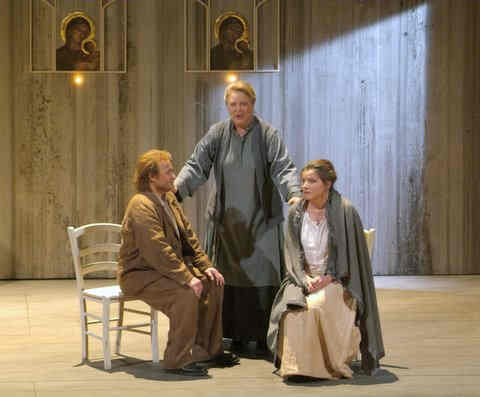Other Links
Editorial Board
- Editor - Bill Kenny
- London Editor-Melanie Eskenazi
- Founder - Len Mullenger
Google Site Search
SEEN
AND HEARD INTERNATIONAL OPERA REVIEW
Leos Janacek, Jenufa: Soloists,
chorus and orchestra of the Opéra de Toulon Provence Méditerranée,
production from the Opéra National de Lorraine, France. 24. 2.2008
(MM)
Janacek's Jenufa is built on a short story, Her Foster
Daughter by Czech novelist Gabriela Preissova, a brief episode
in the life of a young girl struggling with her life in a timeless
rural society. Janacek amplified the elements of the story into
opera, fusing its stark eastern European naturalism with Russian
fatalism, interweaving the comfort and cruelty of its human world
with the beauty and harshness of its physical world. Within the
close confines of this larger world personal and social conflicts
erupt, and are resolved with simplistic brutality. Yet in
Janacek's Jenufa there is redemption, redemption belonging
to the purest Romantic ideal of love. Unlike the musical Romantics
Janacek tells his story not in larger, sweeping musical and
dramatic idealistic terms, but in the smallest and most precise
details of the gamut of emotions that interplay between simple
human psyches. And finally the miracle of Janacek's musical
story-telling is the gigantic proportion of its redemptive
resolution.

Quite an undertaking for the Toulon Opera which already this
season has had real difficulty dealing with the comparative
simplicities of Gluck and Gounod - well, Gluck said he
wanted to be simple, and everyone says Gounod is simple Maybe
these gentlemen are really quite a bit more difficult than they
seem, given that Toulon succeeded fairly well in dealing with the
formidable challenges of Janacek's opera, but failed completely to
meet those in Orphée et Eurydice or Romeo et
Juliet.
Toulon assembled a cast that brought Janacek's countryside
characters to vivid life. Czech soprano Helena Kaupova embodied
Jenufa with a sizable sweetly lyric, young voice and a peasant
presence in the flush of youth, at once passive and stalwart.
Austrian tenor Peter Svensson embodied Laça in a big, almost
beautiful voice, with a not-too-bright presence that was sly,
passive and brutish. Canadian tenor James McLean portrayed Steva,
spoiled because of his boyish cuteness, who had learned long ago
how to escape from his deeper feelings. American soprano Nadine
Segunde brought rigidity, blind stupidity and dignity to Jenufa's
foster mother, the Kostelnicha, in strongly voiced scenes that
were indeed effective though never quite hitting this character's
delicate humanness.
The production was by Jean-Louis Martinelli, whose origins in
straight theater were clearly apparent in this, his only attempt
to stage opera. The production was also warmed over, having had
its original performances at the Opéra de Nancy in 2002. In Toulon
the production was restaged by Ruth Orthmann in second hand
direction that perhaps exacerbated the naiveté of blocking, and
the patently obvious staging solutions that betrayed the emotional
complexities of Janacek's storytelling.
Rare is the production that can assimilate the multitude of
social, natural and personal tensions that make up Janacek's
opera. Mr. Martinelli eschewed the natural world and its ironic
insertions into human lives, the warm light of fall reduced to a
pile of potatoes on a completely white stage, and the excitement
of the emerging colors of spring indicated by a single bouquet of
flowers. The frigid stillness of winter was ignored as Steva stood
in an open doorway to deliver a good part of his second act scene
with the Kostelnicka. The social world that in fact imposes the
tragedy of this infanticide was reduced to a small chorus unable
initially to generate a spontaneous social energy or finally,
lined up against a colorless spring sky, to project this world's
sympathetic morality.
This left Toulon's fine cast on its own ( although certainly with
some help from the stage director) to create Janacek's drama.
Besides the four principals the Grandmother Buryja of Zlatomira
Nikolova effectively grounded the family drama, as the mayor,
rendered by Jean-Marie Frémeau, grounded the social drama. The
smaller roles, the frivolous Karolka of Olivia Doray, the lively
Jano of Anna Kasyan, et al were sensitively cast. All this
with a formidable orchestral underpinning led by conductor
Friedrich Pleyer who very effectively delved into the details and
subtleties of Janacek's score at the expense of realizing its
hysteria or fully capturing its grander emotional sweep - not a
bad trade off if there has to be one.
Janacek's Jenufa builds to a huge denouement, the
Kostelnicha's crime recognized, Jenufa's nearly incomprehensible
humanity extended. Love itself exudes from Laca and finally Jenufa
in overpowering orchestral and vocal outpourings. For this sublime
moment Mr. Martinelli placed his lovers on a high platform upstage
mostly hidden behind a scrim that depicted a primitive, gold
painted Madonna and Child. Perhaps there are gulags somewhere in
the antarctic to send musically insensitive stage directors for
re-education.
Michael Milenski
Back
to Top
Cumulative Index Page
